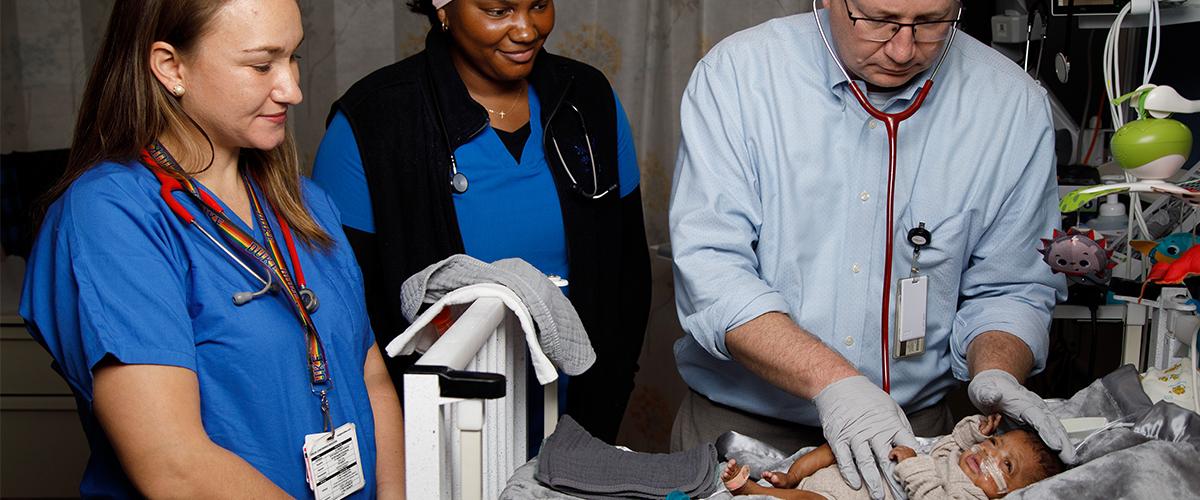
During the first year of fellowship, each fellow at Duke is exposed to delivery room resuscitation, ventilatory management, and intensive care of sick neonates, as well as the convalescent care of recovering infants. In addition, the fellow jointly manages neonatal surgical patients and patients referred to Duke from outside pediatricians, perinatologists and obstetricians. These skills are enhanced as the fellow becomes more independent during the second and third years.
Excellent clinical care depends on a broad knowledge of the underlying physiology, pathophysiology, and clinical literature. Weekly lectures, journal clubs, clinical conferences, core readings, and discussions help build a broad based fund of knowledge in neonatal medicine. During clinical training, the fellow learns the leadership skills needed to supervise a busy intensive care unit with house staff, neonatal nurse practitioners, and respiratory care specialists. In addition, the fellow participates in unit administration which includes problem identification and solutions.
There is a broad range of lectures & seminar series available to more than meet Board and ACGME Core Curriculum requirements including Curriculum Design, Teaching Skills, Comprehensive Introduction to Clinical Research, Molecular Biology Techniques, Introduction to Evidence-Based Medicine, Grant Writing Seminar, and Medical Ethics. Master's-level programs are available to our fellows and include the Clinical Research & Medical Genomics Training Programs, and master's program in Biomedical Engineering.
Clinical Environment
Our 74-bed unit (soon to be expanded to 81 beds) is directly adjacent to the labor and delivery service. The NICU services approximately 4000 deliveries per year. Our affiliate Duke Regional Hospital’s Special Care Nursery has 16 beds. This environment fosters excellent clinical training in a wide variety of neonatal conditions. Duke offers both primary and sub-specialty care to North Carolina and much of the Southeast United States. We also have an active Neonatal Life Flight Transport that services the surrounding communities and states. Fellows participate in the transport of critically ill neonates.
All pediatric medical and surgical subspecialties are available at Duke. During the clinical rotations, fellows provide leadership and oversight of the bedside care team under the direct guidance of a faculty member. The fellows assist in the training of more junior residents and interns during their NICU rotations, and provide consultations for prenatal visits arranged with obstetrical colleagues.
All fellows participate in the administrative activities of the division. As fellows become more senior in training, they are given more clinical leadership responsibilities. The first and second year fellows coordinate joint conferences and lead discussions at patient care conferences. The senior fellows attend the weekly executive administrative meeting in the Unit and actively participate in the development of health care plans and problem solving activities. One or two months of the senior year are spent as "junior attending" on resident team. During that time, the fellow rounds with the team and later a faculty member.
Special Infant Complex Care
Fellows participate weekly in the Special Infant Care Clinic including following a designated cohort of infants (both extremely low birth weight and critically ill full term infants). The clinic focuses on the unique medical and developmental needs of prematurely born and other high-risk infants and toddlers after discharge and during the first two of years of life.
Skills to be learned in clinic include:
- Performing a detailed neurologic assessment of an infant and young child.
- Manage ongoing medical problems of high risk infants (e.g. chronic lung disease, gastroesophageal reflux, growth and feeding problems).
- Gain familiarity with the expected neurodevelopmental outcome of various neonatal problems.
- Determine whether the neurologic and developmental abnormalities of an infant are consistent with the neonatal course, and if not, what further diagnostic evaluations or referrals are indicated.
- Distinguish the transient neurologic abnormalities of premature and sick full-term infants from the early precursors of cerebral palsy.
- Understand the indications and interpretation of the various developmental assessment tools used by members of the developmental team.
- Gain familiarity with the various intervention services available for infants and young children with developmental disabilities and how to help families access these services.
- Develop experience in discussing unfavorable prognosis and outcome with parents in a supportive and compassionate way.
Pediatric Cardiac Intensive Care and ECMO
The neonatology fellows also have a rotation in the Pediatric Cardiac Intensive Care Unit. This rotation is primarily to provide the experience and oversight of the care of postoperative cardiac surgery and ECMO patients. There are over three hundred pediatric cardiac operations performed per year at Duke. During this rotation, the fellow manages care of pediatric intensive care patients under the direction of senior Cardiac/PICU faculty. Fellows further their central vascular access skills and ventilatory management of neonates with cardiac disorders.
There is a strong relationship between Pediatric Cardiology & Neonatology, and fellows can also have an elective rotation. This includes a seminar series & postoperative cardiac surgery experience with joint management of cardiology patients admitted to the NICU pre- and post- operatively.
Maternal-Fetal Medicine
During the fellowship years, there is a rotation within the Division of Maternal-Fetal Medicine in order to gain expertise in prenatal diagnosis, diagnostic ultrasound, prenatal genetic counseling, and multi-disciplinary consultations for complex cases. There is a weekly case conference held between Neonatal Medicine, Maternal-Fetal Medicine, and Obstetric Anesthesiology to discuss active antenatal cases and management. In addition, fellows attend a monthly multidisciplinary fetal case review and are responsible for perinatal counseling under the direction of the neonatal and obstetric faculty.